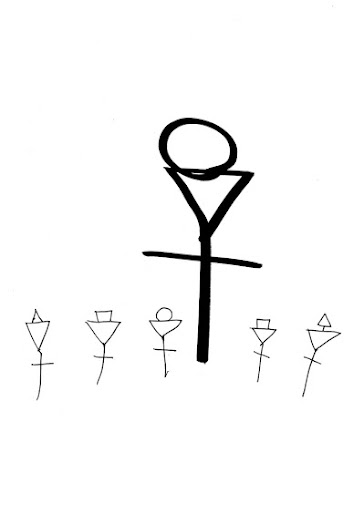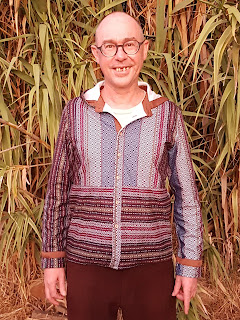MJ: You have a new collection out Glyphs of Uncertain Meaning, can you talk about your book and explain what it is all about?
TG: I reckon I've explained it well in the introduction to the book. From among my many hundreds of pages of glyphs, I've selected a broad range which reproduces well in black & white. They're mostly minimal compositions, many of them less than a poem. Singly, they might not seem to have much weight, but collected together, traversing many styles and techniques, they add up to something heavier. Overall, I'm using visual rhetoric to argue about human made signs.
MJ: You started the first website dedicated to asemic writing. What is your view about how asemic writing has grown, especially on the Internet?
TG: From roughly 2000 to 2007, I was obsessed with spreading the culture of asemic writing, which included the www. A few years back, I realised that I had let go. It's marvelous to see that the seeds that I and a few other people planted have grown in several different directions.
MJ: Do you still make asemic writing or have you moved on to something else?
TG: I've stopped making full page, deliberate pieces where I stand next to a blank piece of paper before starting. Occasionally, while talking on the phone, I doodle, but these are small, rough & often don't feel finished.
Meanwhile, I was recording sound poetry for several years, culminating in the album Sounds. Since then, I've been putting together a weekly radio show called Sound Poetry etc for sound poetry and similar sounds, acting as collector and curator more than primary creator.
It's a strange time for creativity. I'm exploring and compiling things I did in the past, such as sound poetry or asemic writing, but don't currently feel much of an urge to create fresh works. In October 2020, I did over an hour of improvised sound poetry live-to-air on Copperpipe Radio, which felt really good. If I performed more sound poetry at the moment, it would sound like a less intense, less inventive version of the live-to-air performance. Gardening is a recent interest which I'm giving my attention, especially learning about edible weeds.
MJ: What was your process as far as the creation of your soundpo album Shapes?
TG: Mostly improvising in my home studio, then later choosing the best bits. As with asemic writing, I've learned that being in exactly the right mood before beginning to record my creations is the most productive way to work. If I capture 10 minutes of sounds that I've never made before, then relax and turn off the recorder, I'm satisfied. Later, with fresh ears, I decide which ones move me most strongly, and which ones contrast with each other, or are too similar to each other.
MJ: Are you interested in publishing anymore issues of Asemic magazine?
TG: Probably not. It served its purpose in helping to expand the culture around asemic writing.
MJ: You started Asemic Editions which is the brother/sister press to Post-Asemic Press. What do you think about the current diversity of publishing as far as asemic writing is concerned?
TG: I'm probably not all that much in touch with the current playing field. I'm aware that quite a few literary publications accept submissions of asemic writing. A few publishers that I am slightly familiar with are the Danish publisher Non Plus Ultra and the UK publishers who put out Steven J Fowler's books, such as zimZalla and Hesterglock. My plan with Asemic Editions was to focus on sequences of abstract or asemic work, more like abstract graphic novels than collections of single pages of asemic writing.
MJ: Does Buddhism still factor into your life? Do you meditate?
TG: "Buddhist" was the handiest word that I could find in your first interview, to give some idea of my outlook. Walking, which helps me let go of the internal verbalisations of daily life, is the nearest thing I do to a meditative practice. I'm intellectually curious about traditions such as Zen Buddhism, Chan Buddhism, Sufism, philosophical Taoism and so on. However, I'm aware that this isn't the same thing as seriously practicing any single one of these.
MJ: What would you like to do in the future?
TG: Tidy up my unpublished pages of asemic writing. I have several in styles which haven't been published yet. Tidy up my sound recording. I might get cracking on an older book project that I'd put down. Usually, my intentions for the future don't pan out as I might expect them to in an interview such as this!
Since the late '90s, Tim Gaze has been active as a poet, writer, publisher and performer. In particular, he has been very involved in the field of asemic writing, publishing Asemic Magazine and setting up the first website, www.asemic.net. His works include the graphic novel 100 Scenes, glitch poetry collection noology and sound poetry album Shapes. Recently, he completed a degree in linguistics, and hosts the radio show Sound Poetry etc. Dance music such as batida by the Principe Discos artists gets him going. The Adelaide Hills of Australia, in the traditional lands of the Peramangk people, is his home.
Michael Jacobson is a writer, artist, publisher, and independent curator from Minneapolis, Minnesota USA/Turtle Island. He is the author of Works & Interviews, the senryu poetry collection Hei Kuu, and the noise poetry album Schizo Variations. Two forthcoming books by Jacobson are Somnolent Game (2022) and id est (2023). His book publishing project for longer works of asemic writing and experimental poetry is Post-Asemic Press. Since 2008 he has curated The New Post-Literate: A Gallery of Asemic Writing.
The first interview Michael did with Tim is at Litro and can be read here.
Above are some sample pages and cover art from Glyphs of Uncertain Meaning by Tim Gaze.










